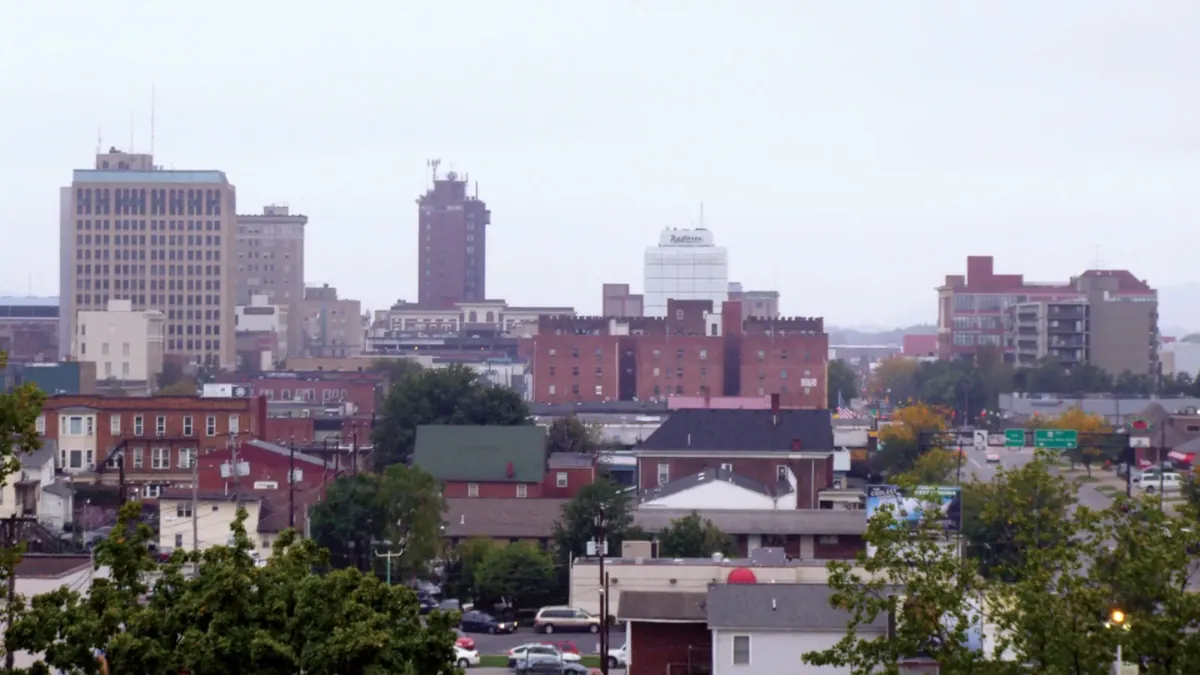Poverty is a persistent and complex issue that affects millions of Americans across the country. In West Virginia, one of the poorest states in the nation, the city of Huntington stands out as a stark example of the struggles faced by communities grappling with economic hardship.
Huntington, once a thriving industrial hub, has experienced a significant decline in recent decades, marked by deindustrialization and the loss of manufacturing jobs. This economic downturn has had a profound impact on the city’s residents, leading to widespread unemployment, low median household incomes, and high poverty rates.
According to recent data, Huntington’s poverty rate is significantly higher than the national average, with over 20% of the city’s population living below the poverty line. This pervasive poverty has far-reaching consequences for Huntington’s residents, impacting their access to essential resources, their overall health and well-being, and their sense of security and stability.
| Factor | Description |
| Population | 48,000 |
| Median household income | $35,000 |
| Unemployment rate | 6.2% |
| Poverty rate | 20% |
| Racial makeup | 85% white, 10% black, 5% other races |
Demographics of Huntington
Huntington is the largest city in West Virginia, with a population of approximately 48,000 people. The city is located in the western part of the state, along the Ohio River. Huntington is a diverse community, with a racial makeup of approximately 85% white, 10% black, and 5% other races.
The median household income in Huntington is $35,000, significantly lower than the national median household income of $67,521. The unemployment rate in Huntington is also higher than the national average, at 6.2%.
Factors Contributing to Poverty in Huntington
The factors contributing to poverty in Huntington are multifaceted and deeply intertwined. The decline of the manufacturing industry has left many residents without a source of income, while limited access to education and training opportunities has hindered their ability to secure new employment. Substance abuse and addiction have also become prevalent issues, further exacerbating the cycle of poverty.
Deindustrialization and job losses
Huntington was once a thriving industrial center, home to a number of steel mills and other manufacturing plants. However, the decline of the manufacturing industry in the United States has had a devastating impact on Huntington, leading to widespread job losses. As manufacturing jobs have disappeared, many residents have been unable to find new employment that provides a similar level of income and benefits.
Limited access to education and training opportunities
Many residents of Huntington lack the educational qualifications and training necessary to secure well-paying jobs in the modern economy. The city’s public school system has struggled to provide students with the skills and knowledge they need to succeed in the workplace. Additionally, access to adult education and training programs is limited in Huntington, making it difficult for residents to improve their job prospects.
Substance abuse and addiction
Substance abuse and addiction are serious problems in Huntington, affecting a significant portion of the city’s population. These issues contribute to poverty in a number of ways, including reducing productivity, leading to job loss, and increasing healthcare costs.
Lack of affordable housing
The lack of affordable housing is another major challenge facing Huntington’s residents. The cost of housing has increased in recent years, while wages have remained stagnant or declined. This has made it difficult for many residents to find and afford safe and stable housing.
Impact of Poverty on Huntington’s Residents
The impact of poverty on Huntington’s residents is evident in many aspects of their lives. Many struggle to afford food and secure stable housing, while others face barriers to accessing quality healthcare and preventive services. The lack of economic opportunities and the prevalence of social issues have also contributed to an increase in crime and violence in the city.
Struggles with food insecurity and housing instability
Food insecurity is a common problem in Huntington. Many residents struggle to put enough food on the table, and some are forced to skip meals or rely on unhealthy food options. Additionally, many residents face housing instability, living in overcrowded or dilapidated conditions.
Limited access to healthcare and preventive services
Residents of Huntington often face barriers to accessing quality healthcare and preventive services. The city has a shortage of doctors and other healthcare providers, and many residents lack health insurance. This can lead to delayed or forgone care, which can have serious health consequences.
Increased risk of crime and violence
The lack of economic opportunities and the prevalence of social issues have contributed to an increase in crime and violence in Huntington. The city has a higher rate of violent crime than the national average.
Efforts to Address Poverty in Huntington
Here are some of the efforts being made to address poverty in Huntington:
Community Initiatives
A number of community initiatives are working to address poverty in Huntington. These initiatives focus on providing essential services, promoting education and employment opportunities, and fostering a sense of community and resilience among residents. Some of the most notable community initiatives include:
- The Huntington Housing Coalition: The Huntington Housing Coalition is a non-profit organization that works to provide affordable housing and supportive services to low-income residents in Huntington. The organization operates a number of affordable housing developments and provides case management services to help residents stabilize their housing and achieve their goals.
- The Huntington Food Bank: The Huntington Food Bank is a non-profit organization that provides food assistance to low-income residents in Huntington. The organization distributes food through a network of pantries and soup kitchens, and also operates a mobile food pantry that reaches underserved communities.
- The Huntington Community Health Center: The Huntington Community Health Center is a non-profit organization that provides primary and preventive healthcare services to low-income residents in Huntington. The center offers a range of medical, dental, and mental health services, and also provides health education and outreach programs.
- The Huntington Literacy Coalition: The Huntington Literacy Coalition is a non-profit organization that works to improve literacy rates in Huntington. The organization provides adult literacy education programs, as well as early childhood literacy programs for young children.
- The Huntington Area Development Council: The Huntington Area Development Council is a non-profit organization that works to promote economic development in Huntington. The organization provides business development assistance, job training, and workforce development programs.
Government Programs and Policies
In addition to community initiatives, a number of government programs and policies are also working to address poverty in Huntington. These programs and policies provide financial assistance, support job training initiatives, and invest in community development projects. Some of the most notable government programs and policies include:
- The Supplemental Nutrition Assistance Program (SNAP): SNAP is a federal program that provides food assistance to low-income individuals and families. The program provides eligible households with a monthly allowance to purchase food at participating grocery stores.
- The Temporary Assistance for Needy Families (TANF) program: TANF is a federal program that provides financial assistance and support services to low-income families with children. The program helps families meet their basic needs, such as food and housing, and also provides job training and other services to help families achieve self-sufficiency.
- The Workforce Investment Act (WIA): WIA is a federal program that provides job training and employment services to adults, dislocated workers, and youth. The program helps eligible individuals find and keep jobs, and also provides support services such as childcare and transportation assistance.
- The Community Development Block Grant (CDBG) program: CDBG is a federal program that provides grants to communities for a variety of community development projects, including affordable housing, infrastructure improvements, and economic development.
Economic Revitalization Efforts
In addition to community initiatives and government programs, efforts to revitalize Huntington’s economy and attract new businesses are also underway. These efforts aim to create employment opportunities and boost economic growth, which can help to reduce poverty in the city. Some of the most notable economic revitalization efforts include:
- The Huntington Redevelopment Authority: The Huntington Redevelopment Authority is a public agency that works to redevelop vacant and blighted properties in Huntington. The agency has a number of projects underway, including the development of a mixed-use downtown project and the revitalization of the city’s riverfront.
- The Huntington Chamber of Commerce: The Huntington Chamber of Commerce is a non-profit organization that advocates for the interests of businesses in Huntington. The chamber works to promote economic development, attract new businesses to the city, and support existing businesses.
- The Huntington Economic Development Corporation: The Huntington Economic Development Corporation is a non-profit organization that works to attract new businesses and investment to Huntington. The corporation provides site selection assistance, financial incentives, and other resources to businesses considering locating in Huntington.
These efforts, along with many others, are working to address poverty in Huntington and create a more prosperous future for the city. By providing essential services, promoting education and employment opportunities, and fostering a sense of community and resilience, these efforts are helping to break the cycle of poverty and empower residents to achieve their full potential.
Frequently Asked Questions (FAQs) about Poverty in Huntington, West Virginia
What is the poverty rate in Huntington, West Virginia?
The poverty rate in Huntington, West Virginia is 20%, which is significantly higher than the national average of 12.1%. This means that one in five people in Huntington live below the poverty line.
What are the factors that contribute to poverty in Huntington?
Several factors contribute to poverty in Huntington, including the decline of the manufacturing industry, a lack of educational qualifications and training, substance abuse, and a lack of affordable housing.
What are the impacts of poverty in Huntington?
Poverty in Huntington has a number of negative impacts on the city, including food insecurity, housing instability, limited access to healthcare, and increased crime.
What are some of the efforts being made to address poverty in Huntington?
Efforts to address poverty in Huntington include community initiatives, government programs, and economic revitalization efforts.
What are the challenges faced in addressing poverty in Huntington?
Addressing poverty in Huntington is challenging due to its complexity, the lack of adequate resources, the need for long-term solutions, and the need for collaboration between different sectors.
What can I do to help address poverty in Huntington?
You can help address poverty in Huntington by supporting community initiatives, advocating for government policies that support economic development, volunteering, educating yourself, and talking to your elected officials.
Conclusions
In conclusion, the designation of Huntington as the poorest city in West Virginia sheds light on the economic challenges faced by its residents. Despite being a vibrant community with a rich history, the city’s struggle with poverty highlights the need for targeted interventions and support from both local and state governments. Addressing issues such as unemployment, access to education, and affordable housing will be crucial in improving the economic well-being of Huntington’s population.
It is clear that concerted efforts are required to uplift the city and its residents, and it is essential for stakeholders to work together to provide sustainable solutions for long-term prosperity. The designation should serve as a call to action for all concerned parties to come together and create meaningful change for the people of Huntington.
Also Read:
- This City in Washington Was Just Named One of the dangerous Cities
- This Minnesota City is Smoking More Weed Than Any Other!
- Unveiling The City with the Highest Weed Consumption in Arizona
- Unveiling The City with the Highest Weed Consumption in New Mexico




